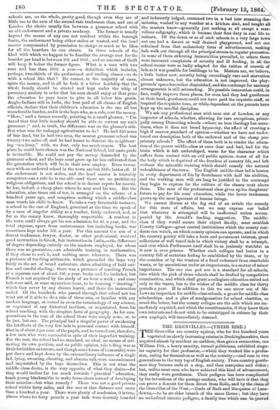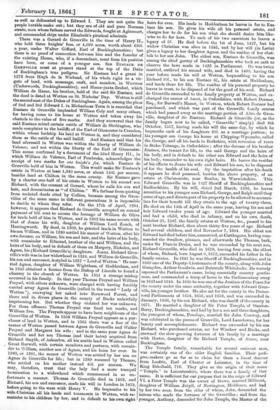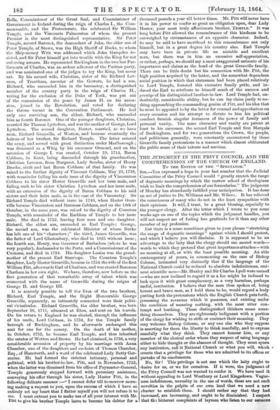THE GRENVILLES.—(THEIR RISE.) HE Grenvilles are country squires, who for
five hundred years T vegetated on slowly increasing estates in Buckinghamshire, then acquired almost by accident an earldom, then gave a connection, one William Pitt, a heavy annuity, turned politicians, exhibited singu- lar capacity for that profession,—which they worked like a profes- sion, caring for themselves as well as the country,—and rose in two generations to the very top of English society. From country gentle- men they became earls at a step, and then marquises and dukes ; but, unlike most men who have achieved this kind of advancement, they really were gentlemen. Their pedigree has been complicated by the inventions of the peerage-makers, who will have it that they can prove a descent for them direct from Rollo, and by the claim of the Granvilles of the West,—Earls of Bath and Marquises of Lana- downe,—to be an elder branch of the same House ; but they have an undoubted historic pedigree, a family tree which can be proved as well as delineated up to Edward L They are not quite the people heralds make out ; but they are of old and pure Norman strain, men whose fathers served the Edwards, fought at Agincourt, and commanded ships under Elizabeth's piratical admirals.
heirs for ever. His lands iu Hoddenham he leaves in fee to Ens- tace his son. He gives his wife all his personal estate, and charges her to do for his son what she should desire him like- wise to do for hers. To each of his two executors he leaves a legacy of 51. He died before the 1st of June, 1427, but his widow Christian was alive in 1453, and by her will (in Latin) gives a legacy to her daughter Agnes, and the residue of her chat- tels to her son John. The eldest son, Eustace de Grenville, was among the chief gentry of Buckinghamshire who took an oath to observe the laws made in 1433 in Parliament. He was twice married, outlived his second wife, and died in 1480, having the year before made his will at Wotton, bequeathing to his son Richard 101., to his son Eustace 61., his estate at Hoddenham, and lands there for life. The residue of his personal property he leaves in trust, to be disposed of for the good of his soul. Richard de Grenville succeeded to the family property at Wotton, and ex- changed the manor of Ascot, in Oxfordshire, with Robert Dormer, Esq., for Burwell's Manor, in Wotton, which Robert Dormer had purchased, and which was part of the Grenville family estates which had passed away as the marriage portion of Alice de Gren- ville, daughter of Sir Eustace. Richard de Grenville (or, as the family began now to be called, " Grenville" simply) died 8th October, 1517, having made his will the same day, by which he bequeaths each of his daughters 801. as a marriage portion; to his younger son George his house at Chipping-Wycombe, called the George, and all his lands in Berkshire, with reversion of rents in Stoke-Talmage, in Oxfordshire ; after the decease of his brother Eustace, the tenant for life, to the said George and the heirs of his body, and in default to his other son Edward and the heirs of his body, remainder to his own right heirs. He leaves the residue of his effects to Joane his wife and Edward his son, to be disposed of for the health of his soul. By the inquisition after his death it appears he died possessed, besides the above property, of an estate at Chelmescote, near Brailes, in Warwickshire. This Edward Grenville was in 1527 Sheriff of Buckinghamshire and Bedfordshire. By his will, dated 2nd March, 1536, he leaves annuities to his younger sons Richard, George, and Ralph until they come of age, and directs part of his property to be allowed to accumu- late for their benefit till they attain to the age of twenty-three. He died on the 14th of April in the same year, leaving his son and heir Edward twelve years of age. Edward the younger married and had a child, who died in infancy, and on his own death, October 31, 1587, the family estates at Wotton, &c., passed to his next brother Richard, then about thirty-five years of age. Richard. had several children, and died November 7, 1604. His eldest son Edward had died before him, unmarried, at Carthagena, having com- manded the Swallow, pinnace, and afterwards the Thomas, bark, under Sir Francis Drake, and he was succeeded by his next son, Richard Grenville, who died in 1618, leaving four sons, the eldest of whom, Richard, born August 8, 1612, succeeded his father in the family estates. In 1641 he was Sheriff of Buckinghamshire, and in 1642 one of the Deputy-Lieutenants of the county, along with John Hampden, Arthur Goodwin, and Buistrode Whitelocke. He warmly espoused the Parliament's cause, being essentially country gentle- man, and commanded a troop of horse in the Parliamentary army in 1643 and 1644. In 1646 he was one of the Justices of the Peace for the county under the same authority, together with Edward Gren- ville, his younger brother. He also sat for the county in the Protec- toral Parliaments of 1654, 1656, and 1658, and was succeeded in January, 1666, by his son Richard, who was sheriff of the county in 1671. He married a daughter of Sir Peter Temple, of Stanton- Berry, Buckinghamshire, and had by her a son and three daughters, the youngest of whom, Penelope, married Sir John Conway, and was celebrated in the poems of Granville, Lord Lansdowne, for her beauty and accomplishments. Richard was succeeded by his son Richard, who purchased estates, sat for Windsor and Bucks, and crowned the slow-growing fortunes of his family by a marriage with Hester, daughter of Sir Richard Temple, of Stowe, near Buckingham.
The Temple family, remarkable for several eminent men, was certainly one of the older English families. Their pedi- gree-makers go so far as to claim for them a lineal descent from Leofric, Earl of Chester or Leicester, in the time of Sing Ethelbald, 716. They give as the origin of their name "Temple," in Leicestershire, where there was a family of that name. It is sufficient for our purpose that in the reign of Edward VI. a Peter Temple was the owner of Stowe, married Millicent, daughter of William Jekyll, of Newington, Middlesex, and had by her two sons, from the elder of whom, John, descended the heiress who made the fortunes of the Grenvilles ; and from the younger, Anthony, descended Sir John Temple, the Master of the
Rolls, Commissioner of the Great Seal, and Commissioner of Government in Ireland during the reign of Charles I., the Com- monwealth, and the Protectorate, the celebrated Sir William Temple, and the Viscounts Palmerston of whom the present Premier is the most distinguished representative. Sir Peter Temple, second Baronet, the descendant of John, the elder son of Peter Temple, of Stowe, was the High Sheriff of Bucks, to whom the Ship-money Writ was addressed which John Hampden re- sisted, and Sir Peter himself got into trouble with the King for not enforcing arrears. He represented Buckingham in the two last Par- liaments of Charles, was an ardent adherent of the Puritan party, and was nominated one of the judges to try the King, but never sat. By his second wife, Christian, sister of Sir Richard Lev- eson, of Trentham, ancestor of the Gowers, he had a son, Richard, who succeeded him in the baronetcy, a distinguished member of the country party in the reign of Charles II., voting for the exclusion of the Duke of York, was put out of the commission of the peace by James II. on his acces- sion, joined in the Revolution, and voted for declaring the throne vacant in the Convention Parliament. He had only one surviving son, the eldest, Richard, who succeeded him as fourth Baronet. One of the younger daughters, Christian, married Sir Thomas Lyttelton, and was the mother of George, Lord Lyttelton. The second daughter, Hester, married, as we have seen, Richard Grenville, of Wotton, and became eventually the heiress of her brother, Sir Richard Temple. The latter entered the army, and served with great distinction under Marlborough ; was dismissed as a Whig by his successor Ormond, and on the accession of George I. was created, October 19, 1714, Baron Cobham, in Kent, being descended through his grandmother, Christian Leveson, from Margaret, Lady Sondes, sister of Henry Brooke, sixth and last Baron Cobham of that family. He was raised to the further dignity of Viscount Cobham, May 23, 1718, with remainder failing his male issue of the dignity of Viscountess Cobham to his sister Hester Grenville and her issue male, and failing such to his sister Christian Lyttelton and her issue male, with an extension of the dignity of Baron Cobham to his said sisters and their heirs male, as in the case of the Viscountcy. Sir Richard Temple died without issue in 1749, when Hester Gren- ville became Viscountess and Baroness Cobham, and on the 18th of October, in the same year, was raised to the dignity of Countess Temple, with remainder of the Earldom of Temple to her issue male. She died in 1752, leaving four sons and one daughter. Richard, the eldest son, succeeded as Earl Temple ; George, the second son, was the celebrated Minister of whom Burke has left one of his " characters ;" the third, James Grenville, was the father of Lord Glastonbury, who died in 1825 without issue ; the fourth son, Henry, was Governor of Barbadoes (where he was very popular), Ambassador to the Porte, and a Commissioner of the Customs, and died in 1784. His daughter Louisa was the grand- mother of the present Earl Stanhope. The Countess Temple's daughter, Lady Hester Grenville, became in 1754 the wife of the first William Pitt, afterwards Earl of Chatham, and was created Baroness Chatham in her own right. We have, therefore, now before us the first generation of that remarkable array of talent which was connected with the name of Grenville during the reigns of George II. and George III.
It is scarcely possible to tell the lives of the two brothers, Richard, Earl Temple, and the Right Honourable George Grenville, separately, so intimately connected were their politi- cal vicissitudes. Richard Grenville, the elder brother, was born September 26, 1711, educated at Eton, and sent on his travels. On his return to England he was elected, through the influence of his uncle, Lord Cobham, in 1734, for the Temple family borough of Buckingham, and he afterwards exchanged this seat for one for the county. On the death of his mother, in October, 1752, he became Earl Temple, and thus inherited the estates of Wotton and Stowe. He had obtained, in 1736, a very considerable accession of property by his marriage with Anna Chamber, one of the daughters and co-heirs of Thomas Chamber, Esq., of Hamworth, and a ward of the celebrated Lady Betty Ger- maine. He had formed the strictest intimacy, personal and political, with his brother-in-law, Pitt, and in November, 1755, when the latter was dismissed from his office of Paymaster-General, Temple generously stepped forward with pecuniary assistance, conveying his offer through his sister, Lady Hester Pitt, in the following delicate manner :—" I cannot defer till to-morrow morn- ing making a request to you, upon the success of which I have so entirely set my heart that I flatter myself you will not refuse it to me. I must entreat you to make use of all your interest with Mr. Pitt to give his brother Temple leave to become his debtor for a thousand pounds a year till better times. Mr. Pitt will never hav it in his power to confer so great an obligation upon, dear Lady Hester, your most truly affectionate brother, TEMPLE." It was long before Pitt allowed the remembrance of this kindness to be outweighed by circumstances of an opposite character. Indeed, he may be said to have sacrificed to this remembrance not only himself, but in a great degree his country also. Earl Temple may have been in private life an amiable and excellent man, but there was in him an excessive self-appreciation, or rather, perhaps, we should say a most exaggerated estimate of his importance and claims as the head of the great Grenville family. There can be little doubt but his connection with Mr. Pitt, the high position acquired by the latter, and the somewhat dependent social position in which that statesman had been placed relatively to Lord Temple, fostered this excessive family pride, and in- duced the Earl to attribute to himself much of the success and prestige of his distinguished brother-in-law. Lord Temple had, un- doubtedly, considerable ability, but he can lay claim justly to no- thing approaching the commanding genius of Pitt, and his idea that he must be appealed to by the latter for counsel and approbation on every occasion and his attempt to dictate to him his political conduct furnish singular instances of the power of family and personal vanity. The same character and vanity are patent at least in his successor, the second Earl Temple and first Marquis of Buckingham, and for two generations the Crown, the people, and politicians generally, were constantly encountered by these Grenville family pretensions in a manner which almost obliterated the public sense of their talents and services.
































 Previous page
Previous page